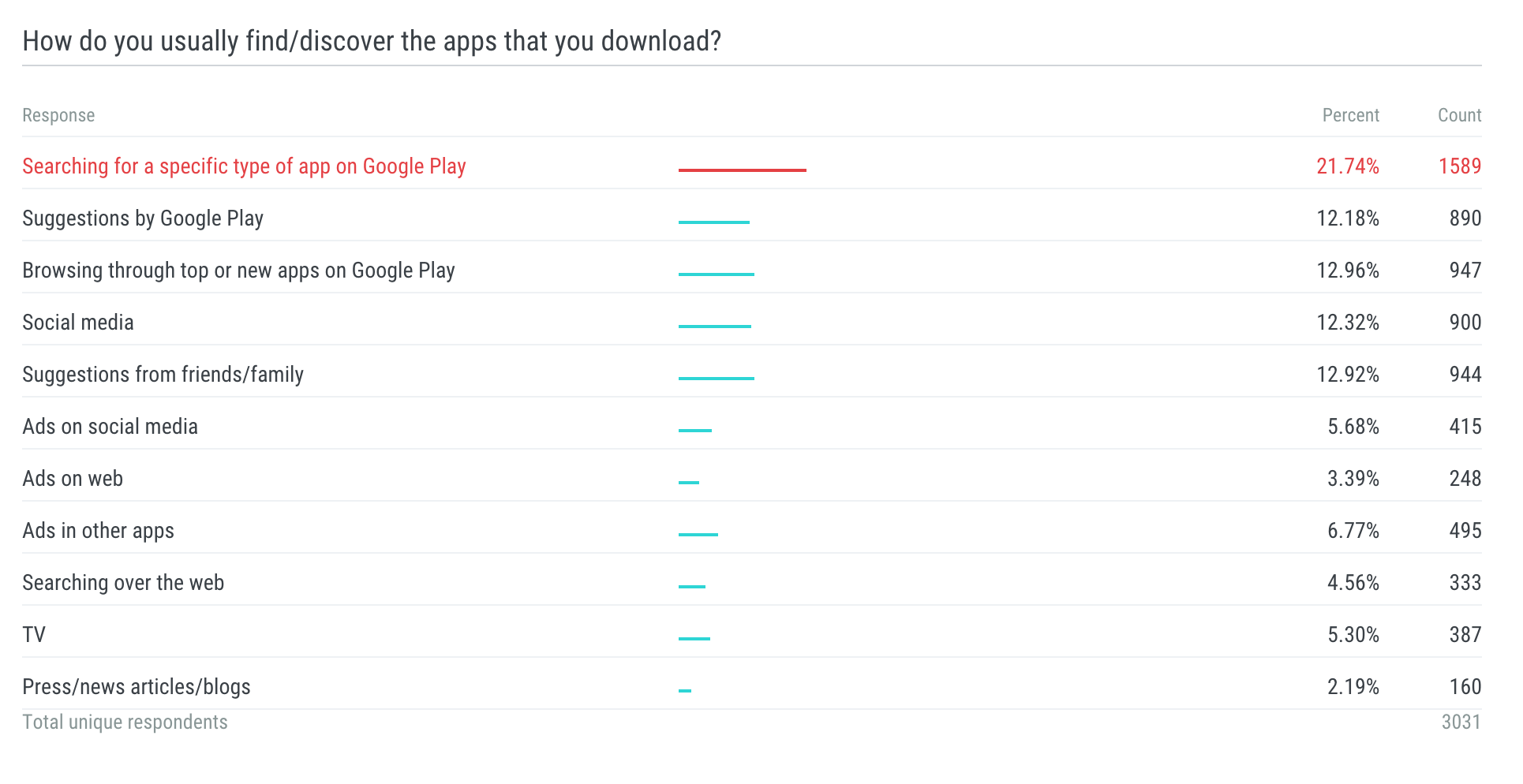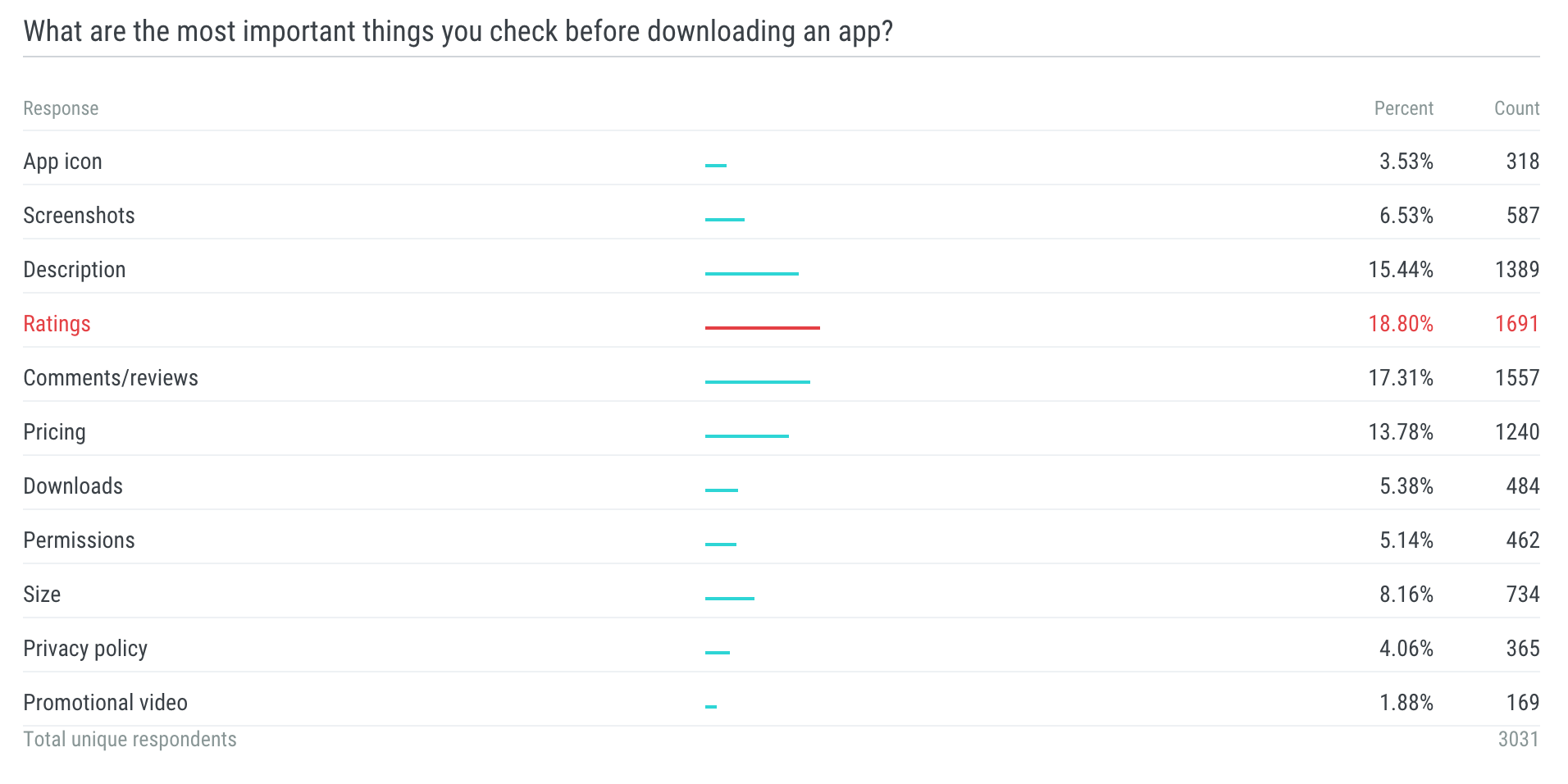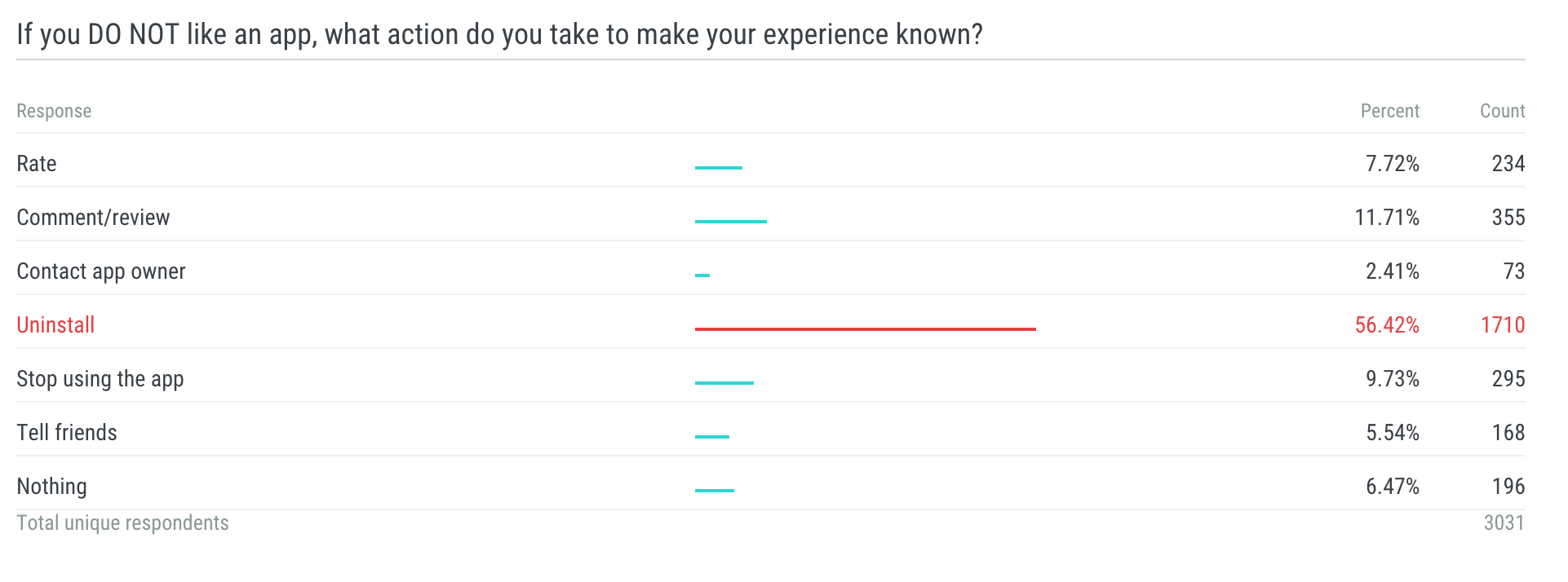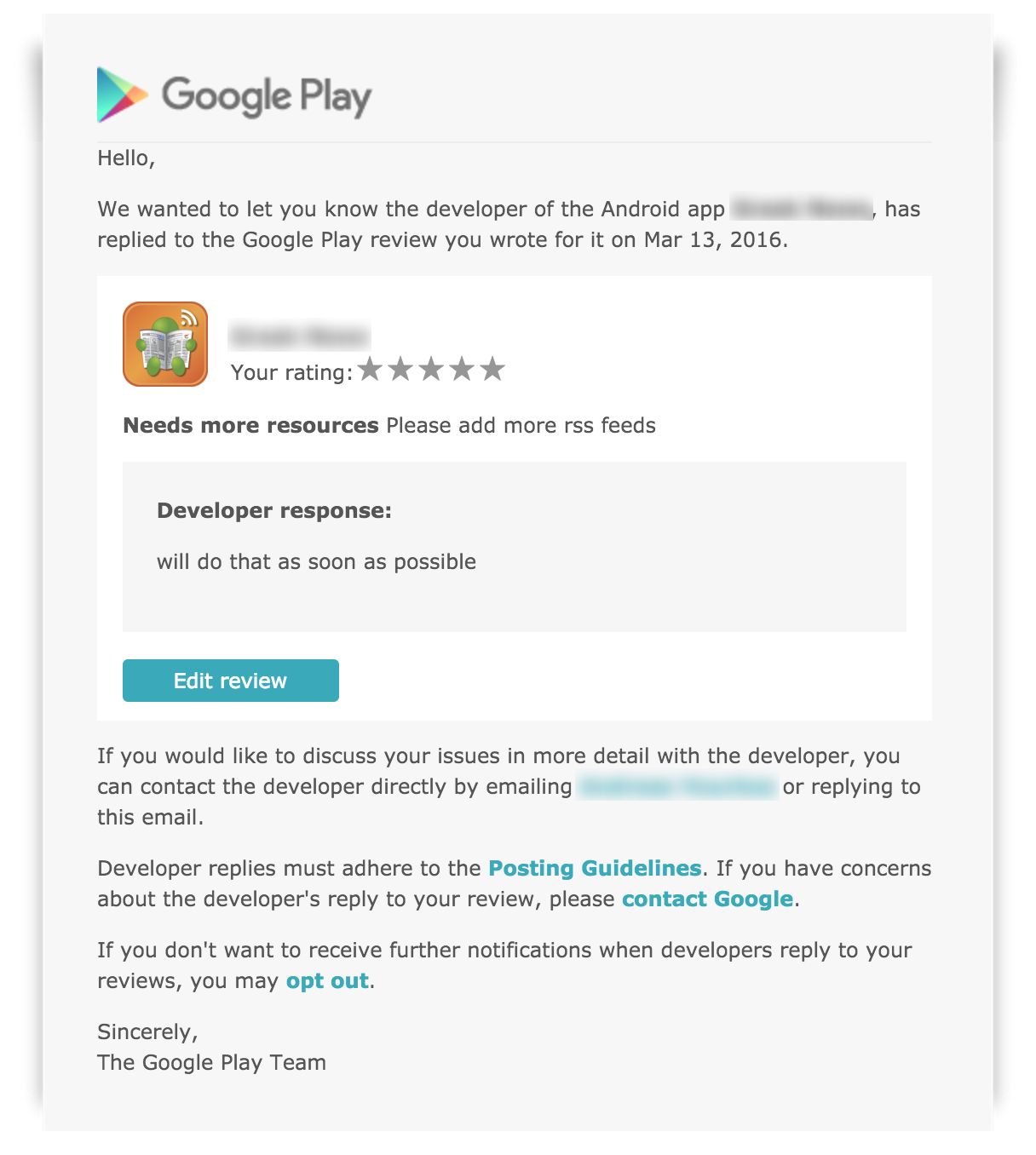Making an app survive in Android’s ocean
As apps’ visibility becomes more and more difficult, app developers are working hard to make their apps stand out among thousands of new apps appearing every day. There is a big variety of articles out there on how to increase an app’s discoverability through ASO techniques, marketing campaigns and others. What is most important, though? Spend on ad marketing campaigns? Creating press releases, or dive into Google Play mechanisms to understand and position better an a
p on store? Anyone could argue that app developers should be doing all of that anyway…this is so true, but where should be their main focus?
By using a Pollfish, a tool that allows direct interaction and gathering of feedback from thousands of mobile app users instantly, the main challenge was to find and ask the right questions: How do you discover apps that you download? What are the most important things that you check before downloading an app?
In order to get an idea of possible answers from users, two surveys were initially crafted (survey1, survey2) and launched where users were able to enter their opinion on several open-ended questions around mobile apps. Answers from those two surveys were used later on, to create a bigger survey that went live at the beginning of March and got distributed to more than 3,000 Android users in US.
How do you usually find/discover the apps that you download?

As expected, from survey responses we can see that being able to list an app higher on search results on Google Play or manage to get featured in top or new apps section, can give a great boost to number of downloads, since most of Android users are looking there when searching for new apps to get on their devices. In addition, word of mouth and social media can also make a difference, since suggestions by friends or family, and trends on social media can easily affect discoverability of an app.
What are the most important things you check before downloading an app?

Letting people discover an app is only the first step. When people end up on an app’s Google Play page, which factors affect their decision on choosing to install that app?
From what we can see, two of the most important things that users look into, are ratings and comments. What the community says about an app makes an impact and therefore being able to attract good reviews and ratings, affects the final decision of new users coming in. Moreover, it seems that drafting a good description that clearly describes what the app can offer can also help towards the download decision for an app.
But how can app developers attract more good reviews and ratings to their apps. What makes people review an app and how can app developers work to improve that in order to bring in more users?
If you like an app, what action do you take to make your experience known?

We can also see some interesting comments from the initial open-ended survey:
- “I might tell someone else about it.”
- “Write reviews so it helps other people with whether or not they should get it”
- “Rating app for others to see my experience and telling friends or posting on social media.
- “I let my friends know by social media”
Well it’s obvious, if you make an app that people love, they will give back! As we can see from the results, the first thing that users do if they like an app, is to rate on Google Play. However, another key takeaway of this chart is that when users like an app, they will also recommend it to their friends, which takes us back to the first point of this article, increasing discoverability of the app through word of mouth.
As expected, the majority of users when they like an app, they try to make that experience known. But what happens if they do not like an app?
If you DO NOT like an app, what action do you take to make your experience known?

We can also see some interesting comments from the initial open-ended survey:
- “Write a review or to the company. Explaining why I don’t like it and what they can do to make it better”
- “Just uninstall and go about my life”
- “Give it a poor rating for others to see”
- “Delete and uninstall”
On the opposite question we can see that more than half of the respondents if they do not like an app they will go and uninstall it right away. However, it is also worth mentioning that more than one out of ten of the users will go to store and give a bad comment/rating prior leaving. This helps us conclude that creating a bad experience within an app does not only affect retention and usage, but also raises barriers from the app community, for new users to come in.
If you leave a rating or comment on Google Play and app owner responds, you will receive an email. (new feature by Google) Will you respond back to provide feedback?
In recent Google Play store changes, Google enabled automated email notifications when an app owner responds to a user review/comment. That was a great advance since in the past, most of the users were never coming back to edit their review or even have a look at a response from a developer.

We can also see some interesting comments from the initial open-ended survey:
- “Absolutely. We’re all human, including developers. If I care enough to leave a bad review, I will follow through to improve the UX”
- “Yes, I will respond so they can utilize my feedback to fix the problems and make it more user friendly”
- “Of course I would because if they took the time to write to me it would be rude not to respond”
- “It depends on how bad the app was”
- “No because it’s just my opinion”
- “No. I choose not to engage strangers”

The question here therefore was if users would take an action when they receive such an email. Almost one out of two stated that they would! This insight, drive us to the conclusion that developers should constantly monitor their Google Play Console (or enable instant notifications on ratings/comments) and respond back trying to solve any issues, and/or interact with any feedback provided by their app’s user base. Such approach will not only help improve the app eventually but also create a better impression for newcomers to the app’s Google Play page.
Encouraging positive feedback and reviews
It is common practice in apps to prompt or show reminders to users in order to give a good rating/review on store. However, most of developers do not have an actual plan on how to do that. Positioning, timing and frequency of such reminders do play an important role on the eventual result. Moreover, developers are not always careful to stick to Google Play policies when implementing such prompts.

We can also see some interesting comments from the initial open-ended survey:
- “Would rather do that on my own”
- “I don’t mind being reminded once in a while but NOT every 3 seconds”
- “I don’t mind the prompt, but if it comes up before I’ve had to even really check out the app or if it comes up every 5 minutes I’ll not rate it whether I end up liking it or not based on that”
- “I’d rather do that on my own. I do however feel some individuals need that extra reminder!”
On the question if users would prefer to be asked to rate an app or do that on their own, it seems that most of the users prefer not to be bothered while few others prefer a reminder. Having that said it should be better to have a section in the app where people could visit (when they decide) and get directed to Store in order to rate and maybe under some circumstances show a well positioned rating reminder that will appear after a specific sequence of events for a limited number of times.
A quick tip here would also be to have a look on how some top apps approach encouraged rating. For example Tinder reveals a feedback section in app’s sidebar after user had spend some time within the app. When right timing fires, users are prompted with a rating popup that contains five stars. If user rates 4 or 5 stars out of five they are navigated to Google Play store, otherwise a text field opens and users are being asked to give feedback on why they do not like the experience of the app. This strategy results only to good reviews passing through to Google Play store, while negative reviews stay only internally and provide feedback to the owner. This is an awesome strategy!
Listen to the users
Finally, a way should be provided for users of an app to provide feedback to the app owner. Many developers underestimate this, but it is really mind blowing how many users do want to provide feedback and is even more interesting what people have to say that could improve an app and position it much better in the ecosystem affecting all previous points mentioned in this article.
On a general question in the initial open-ended survey we asked: “If you would like to tell something to the app owner what would that be?” We can see some of the responses from users below:
- “Why do you need access to all of my contacts”
- “Please make it more functional for lower priced phones”
- “Pay attention to the comments and actually try to resolve the issue”
- “Get as many bugs out as possible BEFORE launch. Some people will try it, get frustrated w/the bugs and never come back out of disgust.”
- “Be sure that you want your first impression to be a lasting one. So do your homework”
- “Make your descriptions accurate. Fix the bugs. Apps shouldn’t make me go broke”
The takeaway here is obvious. Give voice to users…listen, act and engage.
Making an app that will stand out and survive through millions of mobile apps out there is a difficult mission and requires a well-designed strategy. Obviously one of the most important things is to create a good app, but unfortunately, this is not the only thing that is needed. We can argue on that, starting with the simple philosophical thought: “If a tree falls in a forest and no one is around to hear it, does it make a sound? and end up with the question: If you make an awesome app and nobody finds about it, is it still an awesome app?
Do you want to distribute your survey? Pollfish offers you access to millions of targeted consumers to get survey responses from $1 per complete. Launch your survey today.
Global GSK Shingles Survey Insights
Original Insights,The Pollfish Blog
February 24, 2024
Shingles misconceptions: new global survey commissioned and funded by GSK highlights widespread…
B2B Sales Emails: Are they Effective or a Nuisance?
Original Insights,The Pollfish Blog
September 6, 2022
Are B2B sales emails a thorn in your side? Do they drive you crazy? Virtually all white-collar…
